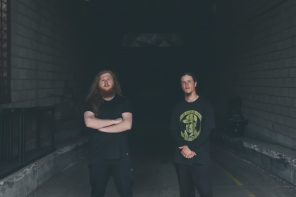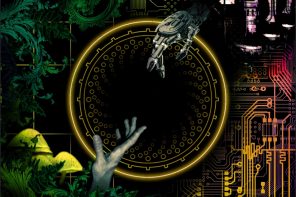
With over a decade of applauded releases under his belt, KiloWatts (real name, James Watts) has become one of the most well-respected electronic artists in the country. His intricate mind has produced some of the most influential albums of the genre, and his collaboration roster continues to impress, with current projects including Skeetaz (a glitchy, psychedelic funk duo with Bil Bless), edgy electronica tracks with singer Peter Van Ewijk, Voodeux (a dark techno collaboration with Tanner Ross) and Super Galactic Expansive (a glitch-hop project with Philadelphian MC Amagine). Through constant experimentation with a plethora of electronic genres, Watts never fails to provide a wide range of mind-bending sounds. Here he answers my questions about music education, the American economy and how he balances his rigorous touring and recording schedules.
LostinSound (Kate Zaliznock): As a native of northern Delaware, which is but a suburb of Philly, it’s always nice to get the chance to talk to artists from the area. What’s your take on the local scene up there? Would you say you have a good community of support, or have you had more success with endeavors in other parts of the country, such as the West Coast?
James Watts: There’s lots of things going on in Philly right now, and plenty to keep everyone busy. The only snag at the moment is the need for more mid-size venues. We have so many vibrant and active communities here, like The Philadelphia Experiment, Rizumu, and Gaian Mind. Philly is a seriously fun city to live in as well, so there’s always something going on around the corner.
LiS: You describe your new duo project with Bluetech, titled Invisible Allies, as “a sublime sense of the exotic.” Where did the inspiration for the explorative new sounds involved in this collaboration come from?
JW: It definitely pays some homage to the realms of the imagination, or spacious and ornate psychedelic realms, higher dimensions. I guess I have a ‘sense of the exotic’ as well. I tend to gravitate towards strange things and go through long bouts of obsession about new hobbies until I’ve exhausted myself of curiosity. Maybe this is the only way to find the exotic. Evan’s sense of melody and structure resonates with my own, so I knew we’d have a rather dynamic and harmonious collaboration.
LiS: I notice that you’ve been classically trained in piano; with today’s ever-expanding field of music technology, do you think a traditional education in music is less important or do you see the opposite? Particularly in electronic music, do you think artists would benefit from more rigorous studies such as yours?
JW: Of course, I think everyone can benefit from a general understanding of musical theory, but I don’t think it’s necessary to be a virtuoso pianist. These days I don’t really play very often – only as long as it takes to get the midi down. With traditional musical theory, it’s so easy to get locked into the way things are supposed to go, that it becomes a challenge to break away. So I find myself trying to break the rules more than I am trying to follow them. But if someone has no grasp of musical theory, chances are it’s going to come out rather dissonant and mechanical. Then one day they may stumble on a certain chord or melody, and it’ll ring up a billion nostalgic musical memories all at once. That may be the sole advantage of musical theory: to find a connection to everything prior. But there’s room for new types of musical theory, of course. Jazz completely rearranged everything, broke all the rules, and re-solidified into a tangible and workable model. Meanwhile in Germany, thousands of people are making machine music with absolutely zero relation to the circle of fifths, and we already have a couple decades of material. And it requires a rigorously trained ear to latch on and follow the direction techno is going, so there’s an example where traditional education would be completely pointless.
LiS: What would be your advice be to someone who is just starting out? How did you get your name out there? What are some effective means of self-promotion versus those that you feel are a waste of time?
JW: Bandcamp and Soundcloud are good. I’ve never been a fan of contests. And the idea of paying someone to play at their festival is ridiculous to me. Do it yourself. Network with other people you connect with on a business and musical level. Make sure all relationships are mutually beneficial. Take the time to stay on top of music technology. Buy your software, because your legitimacy will further your path.
LiS: What’s it like working with Bil Bless? How would you say your respective backgrounds and talents compliment each other musically?
JW: Bil and I are both from Texas and both pianists. It’s helpful we also both have our heads firmly installed into Cubase. But really I think the reason we connect is our knowledge of farm animals.
LiS: Your tour schedule over the past year has been pretty intense. Do you find that constant travel only provides more inspiration, or is it difficult to be as productive when you’re on the move so much?
JW: Yeah, it takes me a day or so after I get back to get in the groove in the studio. I try to keep a fair balance. Once I’m on the road, everything stops and my head is in the clouds. If there are multiple nights in a row, it’s just go go go and I can’t really think about anything else. But, I love traveling, so that’s why I do it. I also do it because it makes me feel like James Bond.
LiS: What do you consider your best memory of 2010, either personal or professional, and why?
JW: 2010 was the Vantastic Teleportour, a 24-date 12,000 mile tour in a van across the country and back with The Great Mundane and Aligning Minds. There will never be another tour like it.
LiS: What’s 2011 look like so far for you? What upcoming project/event/collaboration are you most excited about?
JW: Heading out on tour with Bluetech for the Invisible Allies show in February. New Skeetaz material sometime in 2011. New Super Galactic Expansive over the summer.
LiS: How do you feel your sound has evolved over the years, and what motivated any notable changes?
JW: My main focus has been precision. Playing emotional music comes naturally, and I feel like that’s the macro model of what I’m doing. My head is buried in aspects I can improve on and making music that can’t be played on an instrument. There’s endless unexplored depth between sounds. What does the inside of a quark sound like? Can we find love there too?
LiS: Some have predicted that the current economic situation in America will discourage those who otherwise would have pursued a career in the arts; others suggest the lack of “traditional” employment opportunities will inspire creative minds to nourish their talents. What are your thoughts on the impact of the economic crisis on American musicians?
JW: The mind becomes more inventive in times of crisis, so that may explain why we’re hearing some of the most incredible music ever made in America right now. I can see how more people might flock to the business if there was an easily accessible model for success, but with the current situation I think it has been left to those who truly want to do it. At the same time, we have people working in other jobs who are coming home with loads of extra time to make music for pure enjoyment, with no interest in the business or catering to a market. Meanwhile, peoples’ houses are falling down, everyone’s unemployed or losing their jobs, the environment is trashed… All people want is to see or hear or create something beautiful, to create some contrast in such a dire situation. Call me an optimist, but it seems like a winning situation for art. So you gotta wonder: What would happen if we got rid of commerce altogether?
2011 is already lining up to be a huge year for KiloWatts and with no plans of slowing down in the near future, he promises to remain a key figure in the scene. As interesting offstage as he is on, this musician has what I consider the key element to sustained success; the desire to stay as far from ordinary as humanly possible. For more information on this artist, such as upcoming tour dates and new releases, please visit his website: www.kilowattsmusic.com.

Tracklisting:
01) Jacazsek – Walc – [Miasmah]
02) Shlohmo – For You Pt. 2 – [Error Broadcast]
03) offthesky – On Aerial Archetype (Ten and Tracer Remix) – [Archipel]
04) The Great Mundane – Dairy Products – [Run Riot Records]
05) Bluetech – Escape – [Interchill]
06) K32 – Tanddwr Hela – [Myuzyk]
07) Erik Sumo Band – The Trouble Soup (Myroslaw Bytz Scooped Soup Mix) – [Chi Recordings]
08) TVO – For Brian Haw – [Stuffrecords]
09) Blue Daisy – Strings Detached – [Black Acre]
10) Rodux – Iron Fan (Radius Mix) – [Thoughtless Music]
11) Circuit Bent – Ambiently Speaking – [Zenon Records]
12) Limacon – The Line – [Thoughtless Music]
13) KiloWatts – The Ringing Spheres – [Thoughtless Music]
14) Claude VonStroke – California (Julio Bashmore Remix) – [Dirtybird]
15) Pointbender – Tv Pill – [Harmonious Discord]
16) Martin Skogehall – Penguino – [Railyard Recordings]
Myspace: www.myspace.com/kilowatts
Facebook: http://www.facebook.com/pages/KiloWatts/104988830570




